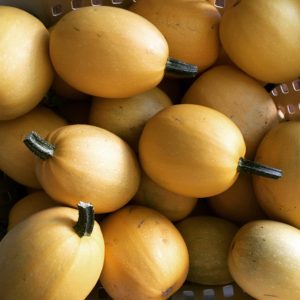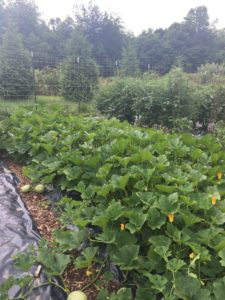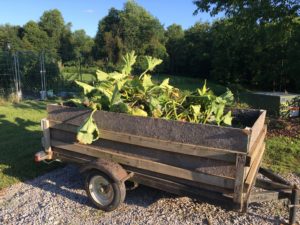 A couple of years ago, I went to a local farmer’s market and found myself looking at vegetable plants. I was excited to find some spaghetti squash and began conversing with the farmer who grew them. He told me about their expected size and taste. I kept thinking that growing them would save money since they were so expensive at the store. While deep in “dreaming phases” of this process, Jeremiah walked up to me and asked, “Sweetie, did you buy more plants? Where are you going to put them? The garden is full.” He was right. I had already planted something in every available space… Except one! “I know,” I said. “They can grow in the back corner!” And into the back corner they went. I’d love to tell you that it was the perfect space for them but it wasn’t. These small plants decided they needed more space than what I had given them. They slowly grew and became monsters, making room for themselves by strangling the life out of a few strawberry plants I had started the year before. Needless to say, I was growing to hate these vines. Eventually, they grew over the bottom fence and into the yard. I did get a few spaghetti squash but not before the corner had become a disaster.
A couple of years ago, I went to a local farmer’s market and found myself looking at vegetable plants. I was excited to find some spaghetti squash and began conversing with the farmer who grew them. He told me about their expected size and taste. I kept thinking that growing them would save money since they were so expensive at the store. While deep in “dreaming phases” of this process, Jeremiah walked up to me and asked, “Sweetie, did you buy more plants? Where are you going to put them? The garden is full.” He was right. I had already planted something in every available space… Except one! “I know,” I said. “They can grow in the back corner!” And into the back corner they went. I’d love to tell you that it was the perfect space for them but it wasn’t. These small plants decided they needed more space than what I had given them. They slowly grew and became monsters, making room for themselves by strangling the life out of a few strawberry plants I had started the year before. Needless to say, I was growing to hate these vines. Eventually, they grew over the bottom fence and into the yard. I did get a few spaghetti squash but not before the corner had become a disaster.
Fast forward two years. I decided to try spaghetti squash once again. This time, I did my homework and found a variety that better suited for our garden. We designed a squash row that would give the plants more room. The plan was to have 5 plants in that row. When the seedlings came up, I took them outside to plant in that row. In case I haven’t confessed this to you before, I will now. I am an over-planter. I see large spaces and have a hard time limiting the number of plants I will put into that space. On the day I planted the spaghetti squash, I placed two plants in each hole. That’s right ladies and gentlemen, I doubled the number of plants in that row. Imagine 10 spaghetti squash plants with each plant projected to supply 8-9 medium sized spaghetti squash. I’ll let you do the math. The reality of this didn’t hit until much, much later.
 As the season went on, the vines grew. They started to take over the plants in neighboring rows but this time, I was ready. I took my pruning shears and cut them back. And that’s when I encountered another issue; these vines were covered in small thorns. I grabbed my gardening gloves but it didn’t prevent the scratches up my arms. I looked like I had been attacked by a ferocious beast with tiny claws. And did I mention that I found out I had a mild allergy to them? Fun times.
As the season went on, the vines grew. They started to take over the plants in neighboring rows but this time, I was ready. I took my pruning shears and cut them back. And that’s when I encountered another issue; these vines were covered in small thorns. I grabbed my gardening gloves but it didn’t prevent the scratches up my arms. I looked like I had been attacked by a ferocious beast with tiny claws. And did I mention that I found out I had a mild allergy to them? Fun times.
The thorns attacked me again at harvest. I will say, the squash were beautiful! But I had to dig through these thorny vines just to get to them. The entire process took several hours. Between needing to stop to wipe the sweat from my burning eyes and applying hydrocortisone to my war torn arms, I carried 90 spaghetti squash into the house using laundry baskets. I wish I could tell you that was the end of the journey. After harvest came the job of pulling the dying vines up by the root. At the end of the day, I had packed a trailer full of thorny plants that needed to be taken to the burn pile. I realize some people use old plants for composting but I’ve found that the soil does better when I remove old plants that may have been exposed to potential disease. We don’t need diseases in the soil laying dormant in anticipation of next year’s crop.
Why am I painting this picture? It comes down to God speaking something to my heart after I had posted a picture of the squash to Instagram. You see, these squash were so beautiful and people loved the photo. Honestly, I enjoyed sharing it. I felt blessed! I was so happy to share the fruits of my labor… especially when I had 80-90 fruits to offer. But it became apparent that these “Insta-moments” didn’t capture the whole story. In fact, it almost painted an overly “glorified” story by only showing the beauty without the hardship. I celebrate how social media has offered connection between people but it also has the power to feed our feelings of inadequacy. When this happens, it can be a breeding ground for envy.
Recently, I ran across a research study conducted by researchers at the University of Pittsburgh who were looking at the effect of social media on depression. The study suggested that, “highly idealized representations of peers on social media elicits feelings of envy and the distorted belief that others lead happier, more successful lives,” (Depression and Anxiety: the official journal of ADAA, 01/19/16).
Before you think I’m just picking on social media, let me just say that we are all guilty of idealizing others in the real world too. How many times have we look at someone’s family, their home, or job only to make assumptions about how they have it all together and maybe our lives would be better if we had that too? Don’t we do the same thing when we see people’s talents and gifting? Someone gets noticed for their music, art or photography and all of the sudden we find ourselves wishing we had their life. Unfortunately, the church is not exempt from this.
Not long ago, I spoke with a woman whose rapid growth in her spiritual gifting promoted her to a public forum. While she was grateful for her position, her heart was rudely awakened to the growing jealousy and resentment from her peers. These “friends” had little understanding about her new world. The truth was that if they knew the sacrifices it took to get here, they wouldn’t want what she had. Leonard Ravenhill spoke about these types of experiences to his son David toward the end of his life: “Prior to his death in 1994 he told me he had received a number of requests from seminary students who wanted to come and see him for the sole purpose of having him lay his hands upon them in order to receive his “mantle.” With his typical dry British humor, but at the same time deadly serious, he said, ‘Everyone wants to have my mantle but nobody wants my sackcloth and ashes.’”
So what’s my point? At various moments in our lives, we will be tempted by envy while watching those around us. When it happens, we face one of two choices: We can turn down the road of jealousy and resentment, or we can choose to celebrate with others. Simply put, envy kills joy. It robs us and the person we envy of experiencing the delight that comes from a Father who gives good gifts to his children at different seasons of life.
In Luke 15, we see the story of prodigal son. It is often referred to as the great homecoming. But what if I told you there was more to the story than a lost son returning home? Think for a moment about the older son who stayed behind with his father. When the lost son had returned home, we find the older son in the fields while the rest of the estate is celebrating.
“Meanwhile, the older son was in the field. When he came near the house, he heard music and dancing. So he called one of the servants and asked him what was going on. ‘Your brother has come,’ he replied, ‘and your father has killed the fattened calf because he has him back safe and sound.’ The older brother became angry and refused to go in. So his father went out and pleaded with him. But he answered his father, ‘Look! All these years I’ve been slaving for you and never disobeyed your orders. Yet you never gave me even a young goat so I could celebrate with my friends. But when this son of yours who has squandered your property with prostitutes comes home, you kill the fattened calf for him!’ ‘My son,’ the father said, ‘you are always with me, and everything I have is yours. But we had to celebrate and be glad, because this brother of yours was dead and is alive again; he was lost and is found.’” (Luke 15:25-32)
In this story we see that the older son has become resentful because of the Father’s gifts toward the younger son. Rather than celebrating, he stays away from his Father’s home and is overcome with jealousy and anger. When the Father goes out to find him, he lovingly reminds the older son that the celebration didn’t jeopardize his inheritance/gift. In that moment, it was time to celebrate someone else. Wasn’t it incredibly kind of the Father to encourage the older son that nothing had been taken from him simply because someone else was being celebrated??
 Lately, I have been challenged to think about the spaghetti squash when I’m faced with the temptation to entertain envy. It is so important to remind ourselves that when we see an individual’s basket full of “bounty,” we are not seeing the whole story. In most cases, we didn’t get to watch their long journey of waiting, of back breaking work cultivating the soil, or the pain and suffering they experienced along the way. I’m sure if we took time to listen to that part of their journey, we would find our hearts more open to the gratefulness that comes from watching a friend’s victory.
Lately, I have been challenged to think about the spaghetti squash when I’m faced with the temptation to entertain envy. It is so important to remind ourselves that when we see an individual’s basket full of “bounty,” we are not seeing the whole story. In most cases, we didn’t get to watch their long journey of waiting, of back breaking work cultivating the soil, or the pain and suffering they experienced along the way. I’m sure if we took time to listen to that part of their journey, we would find our hearts more open to the gratefulness that comes from watching a friend’s victory.
In my last blog, I shared about the journey of healing I went through after our miscarriage. I cannot tell you how deeply touched I was by so many of you who reached out with kindness. Over the last two years, I’ve been asked many times, “Is it painful when you hear that someone is pregnant or has had a baby?” It is my belief that my intentional pursuit to push through my pain and toward God’s healing has left me with this answer: I choose to celebrate with those who have been given the gift of life! Life is precious and comes directly from the heart of God. I have learned that when envy comes knocking, I will choose joy over resentment. The enemy will not have the last word! I choose to thank God for all of His gifts. I know my Father’s storehouse is not limited and I trust that the best is yet to come.
Once again you tapped into truth! Salvation is freely given but the anointing? That’s costly! Love your spaghetti squash sermon.
I agree. I think we’re all looking for the easy button but there are no short cuts. If we don’t recognize that, we’ll put our heads into the soil and miss the gift that growing up is! Dallas Willard brought some clarity to my mind when he said this:”Grace is not opposed to effort, it is opposed to earning.” My actions will not earn me more or less of the love of God because that’s the nature of a gift. BUT the process of maturity is where we find a different choice. We can engage our Father in growing up or we can choose to live in the basement all of our lives.
I love you K!